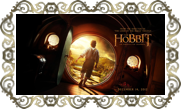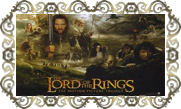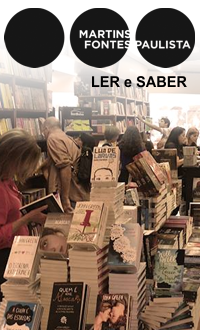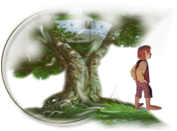

Exciting times it must be for BBC Audiobooks America. For the first time in the US they will release The Hobbit, The Lord of the Rings and the Tales from the Perilous Realm in audio format this year. All are being released on Audio CD and all have some very nice extras.
Have a look here to see all audio editions to be released in the US this year.
Now let us have a look at the BBC dramatization of The Lord of the Rings, which has been released last month by BBC Audiobooks America. Some, who know me very well, are aware that every day I have an hour drive to office (and back again in the evening) and that during that ride I always listen to either BBC World Service, or to Tolkien Audio Books. When the two come together, be sure that it is of interest to me. Here follows a review of the 1981 BBC dramatization of the Lord of the Rings, which has just been re-released in the US, and I highly recommend to any Tolkien fan.
| The newly released edition of the Lord of the Rings Radio Dramatization includes 11CD’s, a bonus CD featuring Stephen Oliver’s complete musical score (with a demo version of John Le Mesurier singing Bilbo’s Last Song), or in total 13hrs and 15 minutes of pleasure. It comes with a foldout version of the map of Middle-earth by Christopher Tolkien. |
| Type: Audio CDPublisher: BBC Audiobooks America Edition: Unabridged edition Release Date: September 9, 2008 Language: EnglishISBN-10: 160283492XISBN-13: 978-1602834927 |
We are now all waiting for the adaptation of the Hobbit and all across the globe people watched the Peter Jackson movie version of the Lord of the Rings. But long before the recent trilogy of films there was the BBC who brought Tolkien's work to life. Peter Jackson, did spent an enormous amount of money, threw in all the latest computer technology, camera tricks and special effects, to create his successful movie adaptation. However, he acknowledges a huge debt to a little-known radio play dramatization of the Lord of the Rings by Brian Sibley and Michael Bakewell. It was in 1981 that, in 26 half-hour stereo installments, the UK radio station BBC Radio 4 did broadcast a dramatization of J. R. R. Tolkien's The Lord of the Rings. Each of the original 26 episodes received two broadcasts per week, individual evening broadcasts of the 30 minute episodes with an hour long omnibus repeat on Sunday mornings – standard practice for many BBC radio serials even today.
The production lacked all the spectacular visuals and sound effects of today’s cinema. Nevertheless, it is by far the very best dramatization of The Lord of the Rings to date. Not only does it remain faithful to Tolkien’s books and are the voice actors brilliant, but also because of the emphasis on the sound alone it allows this adaptation to give full voice to Tolkien's mastery of language (which as some of you know I’m very sensitive about). Also it is very British, with all the subtle varieties in accents, which one also finds in the books and have largely been thrown away in the movies.If you listen to the dramatization and close your eyes, you will not find it very hard to imagine being in Middle-earth. With the fine strategic abridgments, the skillful interweaving of texts (like the appendixes and parts from the Unfinished Tales) and the subtle use of background sounds, one receives a story where you always know what is happening simultaneously to different characters, and this lets even experienced readers of Tolkien’s books enjoy the tale from a fresh vantage point. Peter Jackson is heavily indebted to the groundwork laid by Brian Sibley and Michael Bakewell in this area.
It was always said that it was impossible to bring The Lord of the Rings to the big screen, or make it into a stage drama and for sure some thought it impossible to turn it into a radio series. The book was already split into three volumes (by the publishers) and the length of the tale would proof, next to the vast amount of characters, the biggest obstacle into any adaptation. Much of the tale, the main characters are separated, and we must read on several chapter before finding out what happened to them. New readers can easily get lost in the sea of names, back-story and overwhelming detail.
| Now it were Sibley and Bakewell who proofed all critics wrong and made a broadcasting landmark, a thrilling dramatization of the Lord of the Rings. They used several techniques that might be the key to the amazing result of their dramatization. |
Firstly, they used a fine strategic abridgment by cutting out some parts and shortening others. Old Tom Bombadil was left out, mainly because he does have no impact on the general plot. Also The Old Forest and the Barrow Wights did not make the cut. Some parts in the tale do move up a lot quicker and so one jumps from highlight to highlight, which is actually a fine thing. While the story is trimmed, it feels no big loss appears and we actually get a very rich adaptation of the tale.
Secondly, the story line is rearranged and the red wire through the tale is actually the Tale of Years that we can find in the appendixes. Even some parts from the Unfinished Tales enter into the dramatization, so that at every certain moment you aware where the main characters are. This might be one of the biggest achievements and it must have been Peter Jackson’s biggest help to write down his own script.
Thirdly, at many moments in the story we see some of the minor characters have been cut out of the dramatization and on a few occasions the best lines of that person are transferred to another. Reducing the amount of key characters very much aids the listener in following the story. Still, many of the old favorites are to be heard in the dramatization like Gaffer Gamgee, Farmer Maggot, Nob, Glorfindel, Gamling and Ioreth. And in sharp contrast to Jackson's adaptation, they do speak the lines Tolkien wrote for them.
Finally, the cast is comprised of some of the BBC's finest actors including Ian Holm (here as Frodo), John LeMesurier (Bilbo), Michael Hordern (brilliant as Gandalf) and Robert Stephenson (fantastic Aragorn). Very important is that these voice actors all come from the era when British actors were still highly trained in diction, and it is wonderful to hear Tolkien’s words so clearly enunciated, while still retaining all subtle differences in accents. Ian Holm is, as one can expect, very brilliant. His close friend Sam is marvelously brought by Bill Nighy and Peter Woodthorpe is stunning as Gollum\Smeagol.
| While the BBC dramatization lacks the richness of a big-screen motion picture's soundtrack, there is much to recommend the music in this production. It has been added now as a bonus extra on a separate CD, which is very enjoyable. Some of the music may not be to all tastes but all of it is beautifully orchestrated and delivered. |
And once you listened to the dramatization for some times, the tunes will stick with you, as does the score by Shore, probably the best part of Peter Jacksons’ adaptation.
The BBC dramatization did however use much more of Tolkien's poetry, putting many of the poems and songs to music. Highlights for me would be William Nighy as Sam singing a part of the fall of Gil-Galad and his song in the tower of Minas Morgul. Bilbo's Last Song is a beautiful and heartbreaking accompaniment to the scene at the Grey Havens.When Boromir reports his dream at the Council of Elrond, an English boy's choir singer does a spine-tingling job of singing the "remote but clear" notes of "Seek for the Sword that was broken." Besides those that have been put to music, several other poems are recited; Douglas Livingstone does a splendid job with Gimli's Khazad-dûm poem.
The sound effects are not always what you would expect, especially now we are used to the Peter Jackson’s computer-generated sounds, but for me they do the job perfectly. While on some occasions one really feels to be inside Middle-earth, it is mainly because of the words of Tolkien and some simple sound effects. The rest is left open to our own imagination, which is probably why I do love this dramatization so much.
Jackson claimed he could not tell the story as Tolkien wrote it, because audiences would not be able to accept or understand it. And one of the chief criticisms of Peter Jackson's films is that they omit or profoundly alter important parts of the story, while introducing many new scenes and plot twists. Bakewell and Sibley do no such thing. Tolkien's language is left intact in the mouths of the proper characters; the characters are brought alive by top class British actors, the sound track by Stephen Oliver sets all the poetry and songs to music, the sound effects bring us into the right atmosphere… one step away from Middle-earth. The only thing that remains is your own imagination to enter it.
Spread the news about this J.R.R. Tolkien article:
Read more http://goo.gl/eX7vOD














